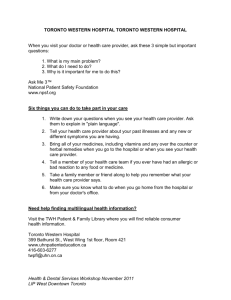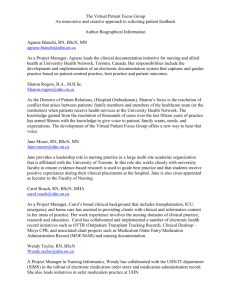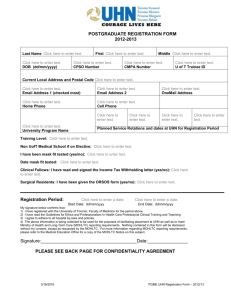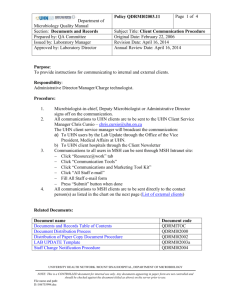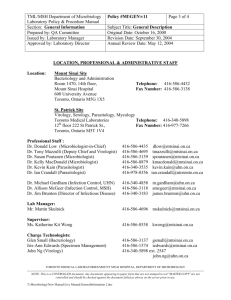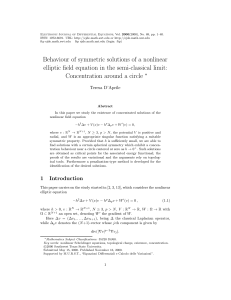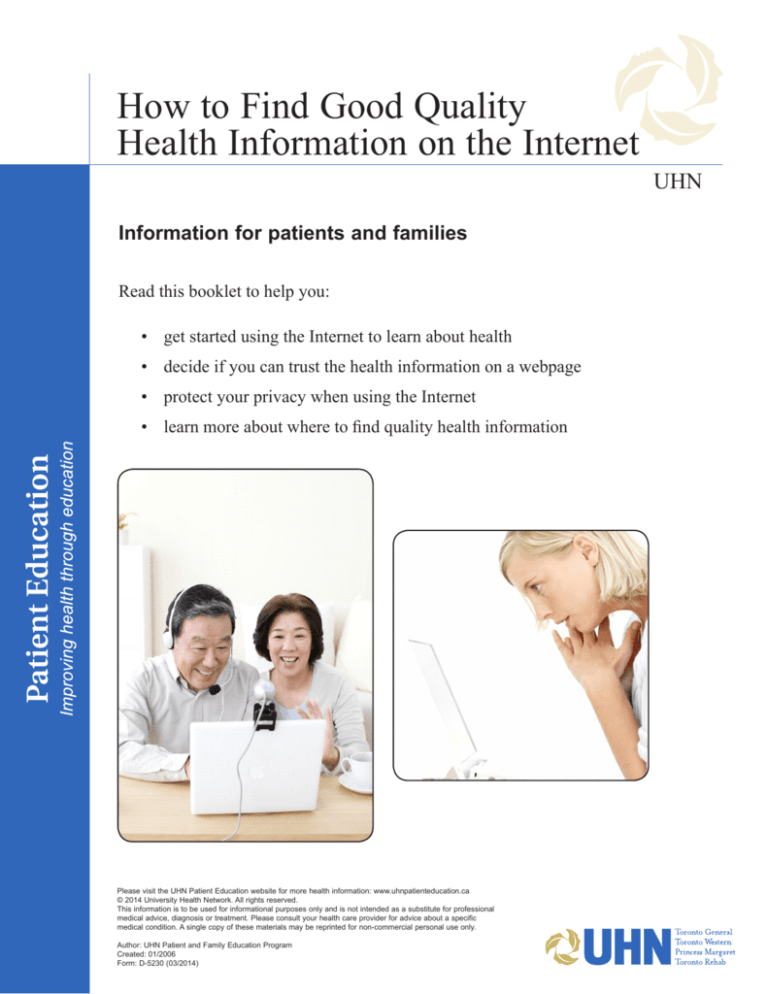
How to Find Good Quality
Health Information on the Internet
Information for patients and families
Read this booklet to help you:
• get started using the Internet to learn about health
• decide if you can trust the health information on a webpage
• protect your privacy when using the Internet
• learn more about where to find quality health information
Please visit the UHN Patient Education website for more health information: www.uhnpatienteducation.ca
© 2014 University Health Network. All rights reserved.
This information is to be used for informational purposes only and is not intended as a substitute for professional
medical advice, diagnosis or treatment. Please consult your health care provider for advice about a specific
medical condition. A single copy of these materials may be reprinted for non-commercial personal use only.
Author: UHN Patient and Family Education Program
Created: 01/2006
Form: D-5230 (03/2014)
UHN
Health information on the Internet
Many people use the Internet to find health information for themselves, family or
friends. There is a lot of good quality health information on the Internet (online).
But, be careful not to trust everything you read. There is a lot of information online that is outdated or incorrect. An organization
may not keep their information up to date or may post information that is not based
on any scientific research. Some may try to convince you to buy a product or
service.
Having the skills to find good quality health information on your own can help you
to improve your health literacy. Health literacy means using different skills to get,
understand, communicate and use information so you can make good decisions
about your health.
Remember: Don’t act on any information you find online without first
talking with your health care provider. They will know the most about
your specific health questions.
How do I get started?
Use your search engine (for example Google or Yahoo)
to get started. Search for websites that were created by
an organization or educational institution (for example, a
university or college) that is well-known, reliable and you have
heard of. This may include a hospital, university, government
agency, or a national organization. Here are a few examples of reliable websites to get you started: University Health Network (UHN) Health Information
www.uhnpatienteducation.ca
Health Canada www.hc-sc.gc.ca
2
Ontario Ministry of Health and Long-Term Care
www.health.gov.on.ca
MedlinePlus from the National Library of Medicine
www.nlm.nih.gov/medlineplus
National Institutes of Health
www.nih.gov
Mayo Clinic
www.mayoclinic.org
How do I know if I can trust the health information I find?
This checklist can help you to decide if a website has good quality health
information:
;; The name of the organization is easy to find.
It is clear to you who owns or hosts the information and the website. The
owner or host is linked to a government organization, university, hospital,
or well-known society (for example: Canadian Cancer Society, Arthritis
Society, and Heart and Stroke Foundation).
;; Contact information is available.
You can find a phone number, email address and/or mailing address on
the site if you want to contact the owners for more information or provide
feedback.
;; The author or editors of the information are qualified health care
professionals.
You can easily find the name, education and experience of the person
who wrote or edited the information. An editorial board has reviewed the
information. The information is up to date and based on scientific evidence,
not just opinion.
;; The website is up to date and updated often.
There is a date at the bottom of the page or article when the information was
written or last reviewed and updated. It is important that health information
is current (up to date). 3
;; The website considers your privacy.
The website has a privacy policy that explains how it uses your personal
information before you choose to provide it.
;; The website has a disclaimer.
You can easily find a disclaimer that explains that the website is for
information only and should not replace seeing your health care provider.
;; The website includes an advertising policy.
You can find a policy to help you tell the difference between what
information is edited properly and what is advertising. This policy also
explains who pays for the information on the website. ;; The website is easy to use.
You are able to find important information and move through the website easily.
Which health information websites should I avoid?
Avoid websites that:
• talk about miracle cures, or try to sell you a health related product. If it
seems too good to be true, it probably is!
• have advertisements included in the body of the articles
• ask you to pay to create an account or to see their information
• don’t provide:
▪▪ clear author information
▪▪ the date the website was created or updated
▪▪ any contact details
▪▪ a privacy policy
• are made up only of forums or discussion groups. These webpages may be a
good place to share your personal journey and find the support of others, but
they are not usually run by medical professionals.
Be sure to discuss any advice or information you find on web forums with
your health care provider before acting on it.
4
How do I protect my privacy?
Avoid sharing private information about yourself on a website. Carefully read
through the privacy policy of a website to make sure that it will not share your
personal information with others. If you can’t find a clear privacy policy, don’t
provide your personal information.
On any website, try to avoid sharing your:
• Social Insurance Number (SIN)
• credit card information
• home address
• date of birth
Where can I learn more?
The Patient and Family Libraries in the University Health Network can help you to
learn more about good quality health information on the Internet. Contact the University Health Network Patient & Family Library or Resource
Centre that is most convenient to you: The Princess Margaret Cancer Centre
Patient & Family Library
Main Floor, Atrium
610 University Avenue
Phone: 416 946 4501, extension 5383
Email: patienteducationpmh@uhn.on.ca
Toronto General Hospital
Peter and Melanie Munk Patient & Family Learning Centre and Library
Norman Urquhart Building – Level 1
585 University Avenue
Phone: 416-340-4800, extension 5951
Email: tgpen@uhn.ca
5
Toronto Rehab – University Centre
Sun Life Patient & Family Resource Centre
Main Floor, Room 1-123
550 University Avenue
Phone: 416 597 3422, extension 3558
Email: torontorehabhealthinfo@uhn.ca
Toronto Western Hospital
Paul B. Helliwell Patient & Family Library
West Wing – 1st floor
399 Bathurst Street
Phone: 416 603 6277
Email: twpfl@uhn.ca
6


